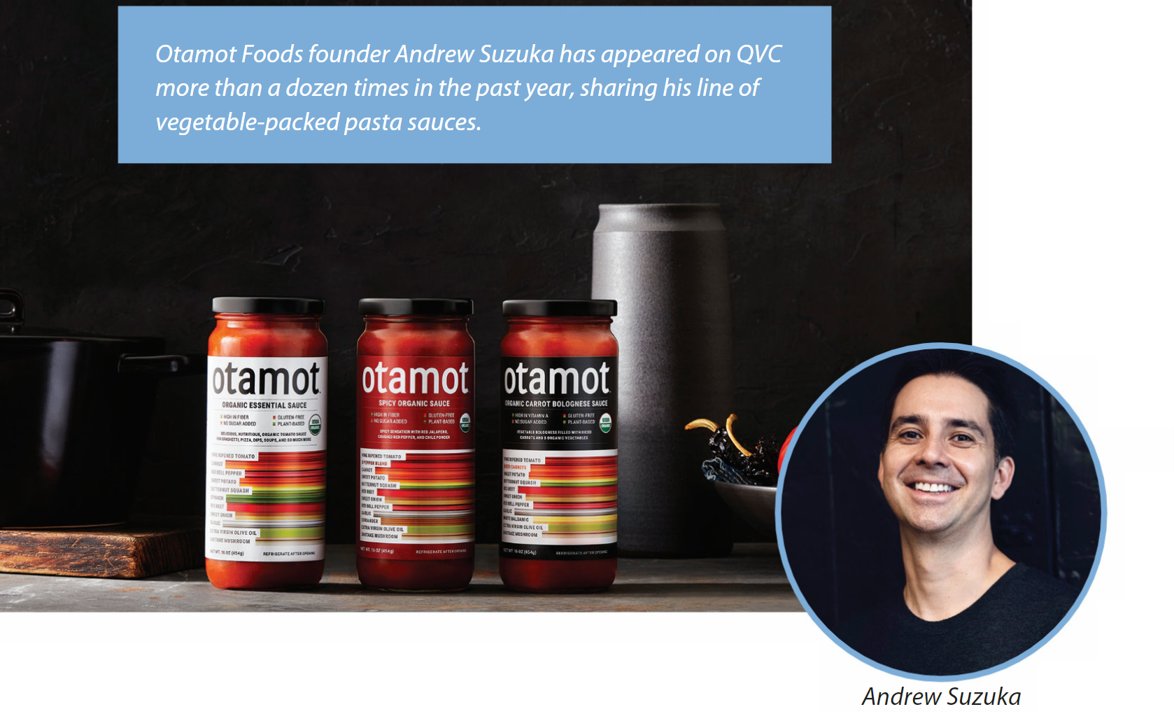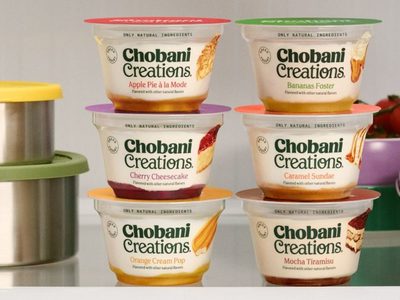KANSAS CITY — The past year saw renewed interest in television shopping networks, providing an opportunity for emerging packaged food brands to gain broad exposure.
Since the onset of the pandemic, an additional two million shoppers tuned in to QVC and HSN, originators of the on-air sales pitch, expanding an already tremendous reach, according to parent company Qurate Retail Group. The networks also tracked a significant uptick in demand for grocery and gourmet products.
“This explosion of interest recently in livestream shopping speaks to the consumers’ hunger,” said Michael A. George, president and chief executive officer of West Chester, Pa.-based Qurate Retail Group, during an investor presentation this past November. “They have more engaging, more immersive digital experiences that can begin to replace the energy of the physical environment.”
Home Shopping Network, later rebranded HSN, debuted nationally in 1985 and was followed the next year by rival and future owner QVC Network. The two brands today reach more than 90 million homes in the United States and 380 million homes worldwide through the broadcast channels, plus millions more through streaming, web, mobile and social platforms, according to the company.
“As a pioneer of video storytelling, QVC has a long tradition of launching and fostering the growth of some of today’s most successful brands,” said Rob Robillard, senior vice president of merchandising home, culinary, electronics and merchandising operations for QVC and HSN. “We’ve always sought out brands with great stories to tell. And a great storyteller to bring the brand to life — someone who is authentic and passionate about their brand. Our most successful storytellers had a personal journey that led to the creation of product. Their brands were built out of experiences.”
Andrew Suzuka, founder and CEO of Otamot Foods, New York, has appeared on QVC more than a dozen times in the past year, showcasing his line of pasta sauces formulated with 10 organic vegetables. A marketing executive, Mr. Suzuka several years ago created the initial recipe, which contains butternut squash, beets and shiitake mushroom with no added sugar, to sneak more nutrition into his daughter’s diet.
 “Working on building a national brand at a rapid pace is not easy,” Mr. Suzuka said. “It takes a lot of time and creativity. QVC is a great platform to help people get to know you, get to know your brand, get to know your story.”
“Working on building a national brand at a rapid pace is not easy,” Mr. Suzuka said. “It takes a lot of time and creativity. QVC is a great platform to help people get to know you, get to know your brand, get to know your story.”
During one particularly successful eight-minute segment, he sold more than 20,000 jars of sauce. His presence on the network has helped him gain an understanding of which product attributes resonate most with consumers based on spikes in sales during the broadcast. Demonstrating the versatility of the product as a base for hummus, soup or a Bloody Mary cocktail, for example, is a hit among viewers.
“It’s a really unique audience, and it’s a giant one,” Mr. Suzuka said. “It’s one that can really impact your business from multiple angles. I started to realize that the more and more shows I got into, how it can really change the course and help open up new opportunities that weren’t available before.”
Core customers of the networks are women ages 35 to 64. Shoppers making 20 purchases or more a year represent nearly 70% of annual sales, according to Qurate Retail Group. The highly engaged audience, what the company calls its “best customers,” visits the company’s websites 33 times a month, views its television programming 19 days a month, and purchases 69 items a year, spending $3,300 on average.
“We can safely say that we have brought in more best customers during the pandemic period than at any time in history,” Mr. George said during the investor presentation.
Prior to the pandemic, Mr. Suzuka recorded several in-studio segments, and then later switched to phone and video interviews with the show hosts. In addition to his original sauce, he has showcased two of his newer offerings, including a plant-based creamy vodka sauce made with cashew butter.
“If I was launching a new brand today, food or not food, I would absolutely start with QVC,” Mr. Suzuka said. “There’s nothing bad that can happen and only positives.”
Another upside, he added, is an accelerated “speed to shelf” compared to traditional grocery retailers.
“Retailers can plan eight months in advance… you meet them, and if you’re in, you will not be on the shelves most likely for eight or nine months,” he said. “Speed to shelf with QVC is weeks instead of months.”
Tuning in to health trends
A recent push for more better-for-you food brands was inspired directly by customer requests, Mr. Robillard said, noting “interest in the health and wellness category has skyrocketed over the last year.” A bone broth company became the network’s bestselling food brand last year, for example.
The team at QVC seeks so-called “hidden gems,” exclusive products and entrepreneurial brands with differentiated concepts. Recently featured on its “Powered by Plants” program, The Worthy Co. is a Chicago-based maker of plant-based nutrition bowls described by the host as “pudding meets smoothie.” The products are formulated with fruits, vegetables, seeds and legumes, featuring flavor profiles inspired by the founders’ favorite childhood treats, such as vanilla orange and dark cocoa cherry.
 Founders Nydia Shipman and Sarah Renahan said the experience exceeded expectations and they planned to record another appearance.
Founders Nydia Shipman and Sarah Renahan said the experience exceeded expectations and they planned to record another appearance.
“We saw a massive uptick on both Amazon and our website in terms of traffic and purchases, which was certainly attributable to the event,” Ms. Renahan said. “I think it’s a phenomenal opportunity for an early-stage company.”
In the absence of in-store sampling and field marketing opportunities, appearing on QVC quickly introduced the brand to an extensive consumer base. The founders also tapped into the brand’s rapidly growing following to promote the segment.
“We’ve actually gotten some really lovely emails from people who wanted to let us know they saw us on QVC, they received their bowls, they loved their bowls and would be ordering through QVC again,” Ms. Shipman said.
Ms. Shipman and Ms. Renahan participated in multiple preparation calls prior to the taping to learn how to manage the process effectively and received coaching on live, authentic product storytelling. They also contacted other entrepreneurs for advice and insights.
“Being able to show a little bit of behind the scenes of our company and brand and who we are as people … That’s a unique experience with QVC,” Ms. Shipman said.
A launchpad for new brands
Brands and founders may be scouted by brokers, producers and program hosts. Mr. Suzuka was approached during a trade show by representatives of the network. Ms. Shipman and Ms. Renahan learned of the opportunity through fellow food entrepreneurs. QVC also seeks new vendors through The Big Find, an international search for early-stage companies across a variety of categories that was expanded last year to include food.
“Entrepreneurship is at the heart of our business and is a vital part of our commitment to our communities,” Mr. Robillard said. “We nurture entrepreneurs of all backgrounds so that startups can become sustainable sources of income, inspiration and community strength.”
Actual Veggies, a New York-based startup, marked its official debut on QVC earlier this year. The brand offers thick-cut patties formulated with whole beans and vibrant vegetables.
 Founders Jason Rosenbaum and Hailey Swartz learned in late November the brand had been accepted by the network and scrambled to expand production for an early January appearance. Help arrived from a co-manufacturing partner, who handled distribution for the company’s instant influx of orders.
Founders Jason Rosenbaum and Hailey Swartz learned in late November the brand had been accepted by the network and scrambled to expand production for an early January appearance. Help arrived from a co-manufacturing partner, who handled distribution for the company’s instant influx of orders.
“This was our first big production run,” Mr. Rosenbaum said. “It was so amazing for us. We sold out on QVC.”
The business was born last spring, following Mr. Rosenbaum’s transition to a plant-based diet. Actual Veggies was developed as a healthier alternative to plant-based meats on the market, Ms. Swartz said.
“When you go to a restaurant and you get a good veggie burger, it’s like a delightful, delicious experience,” she said. “Why isn’t that something you can find in the grocery store?”
Varieties include The Actual Black Burger, with black beans, parsnips and red peppers; The Actual Orange Burger, featuring sweet potato, carrot and red pepper; The Actual Green Burger, containing kale, broccoli and spinach; and The Actual Purple Burger, a blend of beet, carrot and red onion.
In May, the company was accepted to participate in the Big Idea Ventures accelerator, which provided capital and connections. During the summer, the products launched at Pop Up Grocer in Brooklyn, catching the attention of a QVC broker.
“She walked us through how to handle QVC,” Mr. Rosenbaum said. “It all kind of came together, what we’d been working on for a year now, and it was amazing to see it on TV, and people are loving our products and buying our products and reordering our products, so it’s really coming full circle.”
How to get on QVC
Ready for your close-up? Rob Robillard, senior vice president of merchandising home, culinary, electronics and merchandising operations for Qurate Retail Group, explained how brands are selected to appear on QVC and HSN.
Food Entrepreneur: How can brands land airtime on QVC?
Mr. Robillard: We have a long and storied history of launching and fostering the growth of some of today’s most successful brands over the years, and we identify brands through multiple avenues, including trade shows, pitch events, and through direct product submissions. We have also conducted multiple on-the-road tours and online searches to find new, relevant and exciting brands to bring to our customers — and these efforts are ongoing.
Do entrepreneurs need to work with a sales broker to appear on QVC?
Mr. Robillard: In addition to the numerous avenues an entrepreneur/vendor can submit their product for consideration, vendor reps are also another resource where brands are introduced to QVC. Experienced vendor reps are familiar with the QVC business model and can act as advisers to smaller brands, helping them navigate the details for a successful launch or on-air appearance. Some of these entrepreneurial brands are just getting started and with limited capacity, vendor reps are an important resource for them.
Do founders need to audition or pass a test in order to be featured on a broadcast?
Mr. Robillard: If the founder of the brand/product will be the on-air guest, QVC does require that they attend our Guest Excellence training program, which will help set them up for a successful on-air appearance. QVC also has a very robust onboarding and mentoring program available to our new vendors and up-and-coming entrepreneurs, frequently tapping into the existing vendor community’s expertise as a resource. QVC’s vendor community will often share their insights, answer questions, and even coach new vendors on live, authentic product storytelling.
Do brands pay fees to appear on QVC?
Mr. Robillard: QVC and HSN do not sell airtime.




